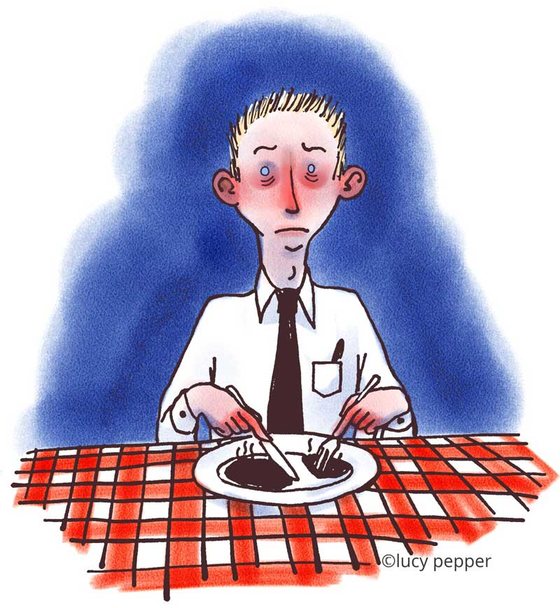No início, reparamos em tudo. Porque tudo parece diferente. É como ser criança outra vez. A nossa cabeça é inundada todos os dias com novas informações, e o tempo torna-se mais lento. O cheiro de tudo, o toque de tudo. Reparamos no olhar das pessoas, como cuidam de si próprias, como se tratam uns aos outros. Reparamos em todas as minudências, porque são diferentes das minudências a que estávamos acostumados.
E quando somos uma espécie de animal que escreve (e no meu caso, também desenha) tudo isto tem de ser passado a escrito (ou desenhado). O bom, o mau, o estranho, e sobretudo a graça que as coisas têm, porque é assim que se comunica melhor. É um impulso muito forte: “Sou de outro país, e esta é a maneira como eu vejo as coisas aqui!”. É a mesma coisa que ser pintor, por exemplo: “isto é o que vejo! Estas são as cores e as formas, as luzes e as sombras”.
Depois, pessoas do país leem o que escrevemos, e ou gostam ou ficam muito zangadas.
Tal como eu escandalizo muita gente quando escrevo sobre Portugal, João Magueijo escreveu sobre a Grã-Bretanha e também parece estar a escandalizar alguns britânicos. Depois de citações do seu livro “Bifes Mal Passados” terem sido publicadas no Times (citações que, para variar, dão uma boa ideia do tom do livro), o resto da imprensa britânica pegou no tema, e ele próprio diz que tem recebido muitos emails. O seu estilo sarcástico de arrancar-as-tripas é capaz de funcionar bem em português. Para mim, porém, não funciona.
Porquê? Não é porque o que diz não seja verdade. É bem possível que Magueijo tenha tido o azar, durante os seus 25 anos no Reino Unido, de só se ter dado, entre os habitantes das ilhas britânicas, com os mais selvagens (os “bifes” são animais violentos), os mais malcheirosos (os “bifes” não se lavam) e as mais mal educados (os colegas “bifes” não se cumprimentam uns aos outros).
Não é porque eu não acredite que Magueijo foi a sítios horrendos, como montanhas durante tempestades, onde foi sujeito a muita molha e a muita lama, ou como Margate, onde, segundo parece, esperava encontrar uma praia simpática. Margate! (aqui, realmente, tenho pena dele).
Pode também ter acontecido que tudo tenha mudado muito desde que saí da ilha, e as “bifas” hoje em dia estejam de facto mais dispostas a proporcionar sexo oral a um homem do que a cumprimentá-lo com um beijinho na face (reparo, no entanto, que nas caixas de comentários dos artigos sobre Magueijo na imprensa inglesa, muitos dos homens que lá escreveram perguntavam, divertidos ou desesperados: “onde é que eu posso encontrar esse sexo oral gratuito??”).
Pergunto-me se, no fundo, o problema não tem a ver com diferentes sentidos de humor.
Para os britânicos, tudo pode ser motivo de piada. Tudo, quer sejam coisas amadas, quer sejam coisas odiadas. Pensemos, por exemplo, em algo que muitos conhecem, a comédia televisiva Fawlty Towers. Basil, o gerente representado por John Cleese, é esquisito e terrível. No entanto, a série tem graça, precisamente porque nos faz gostar de Basil, embora ele seja horrendo. Em Portugal, parece-me que o humor é normalmente reservado para as coisas odiadas (odiadas pelo autor do humor, claro está). É raro alguém gracejar de modo genuíno e forte sobre algo que estima. Um comediante da esquerda não goza com a esquerda. Um comediante da direita não goza com a direita.
Talvez seja por isso que eu consigo enfurecer tanta gente em Portugal, todos aqueles que me dizem “volte para a sua terra!”, porque o facto de eu fazer humor sobre Portugal é entendido por eles como um sinal de que odeio o país.
O problema de Magueijo é que ele não deixa transparecer, entre as linhas, qualquer simpatia pelo país onde vive e sobre o qual escreve. Muito provavelmente, ou porque não sabe, ou porque está a escrever para uma audiência que não reage a esse género de humor. É verdade que há um “disclaimer” no fim deste livro rabugento, onde o autor confessa que, realmente, até gosta dos britânicos, mas que “as graçolas de mau gosto”, cheias de hipérbole e veneno, eram “a única forma de lidar com este país sem recorrer ao suicídio”. Não chega.
Se o livro for traduzido, só vai ser lido por aquelas almas que gostam de se sentir ofendidas, gente com muita voz mas pouca força. O que é pena, porque entre proclamações inacreditáveis e interpretações erradas, o livro contém algumas verdades feias que convinham fossem lidas e ouvidas pelos britânicos.
Magueijo, an over-cooked, rubbery steak
At first, you notice every tiny thing. Everything is different. It’s like being a child again. Your head is flooded daily with new information and time slows down for a while. The smell of everything, the feel of everything. You notice the look in people’s eyes, how they treat you, how they treat each other. You notice all the minutiae that is different to the minutiae that you are accustomed to, which is all the minutiae.
If you are the kind of person who writes (and, in my case, also draws) all this has to go on paper, real or electronic. The good and the bad, the strange and the funny, because that’s just how you communicate. It is an uncontrollable urge. “I’m from outside, and this is what I see!” It’s the same being a painter, “this is what I see! These are the colours, and the shapes, the lights and the shades”.
Then people inside read what you write and they either enjoy it or are enraged by it.
Just as I enrage people when I write about Portugal, João Magueijo has written his own culture shock down in a book, and it may well enrage people in the UK. After quotes from his book, “Bifes Mal Passados”, were outed in the Times (quotes which, unusually for quotes taken out of books, fairly accurately reflect the tone of the book) the rest of the press has been all over it, and he tells that he has had “letters”. His style of over the top, unrelenting rip-the-guts-out-of-it sarcasm may go down well with some in Portuguese, but it doesn’t work for me.
Why? It’s not because what he says is untrue. He may well have had the misfortune in his 25 years in the UK to have friends and acquaintances who are the worst (all bifes are animalistic and violent), smelliest (bife hygiene is shockingly poor) and rudest (bife acquaintances never say good morning to each other) people.
It’s not because I don’t believe that he has been to awful places, like in the mountains on horrid stormy days where, poor thing, he and his delicate constitution got terribly wet and muddy, or, and really, poor guy, Margate, MARGATE, where he went expecting a nice seaside break.
Maybe things have changed an awful lot since I left, and British women really are more likely to give a man a blow job than kiss him on the cheek as a hello. But I note that many of the comments by men in the articles written about the book in the British press were “Where can I find these free blow jobs??”.
I wonder, after all, if it’s down to the differences between the senses of humour.
For the British, everything can be made fun of. Everything, whether it’s something we love or something we hate. Think of an example most of you might know, Fawlty Towers. We love Basil, the dreadful, awkward hotel manager played by John Cleese. It’s funny because we love Basil, even though he is awful. In Portugal, it seems to me, humour is usually only made of things that are hated (hated by the author of the humour). It is rare to find something genuinely and bitingly funny made about something that is loved. A left wing comedian doesn’t tell jokes about the left. A right wing comedian doesn’t tell jokes about the right.
Maybe that is why I enrage so many people, maybe why I am told to “go home” so often, because they take my making fun of things as hatred.
So maybe it’s just that the problem with Magueijo, that he doesn’t know how to show love in between his lines, and further, doesn’t need to because he is writing for an audience that doesn’t respond to it, doesn’t require it. It is true that there is a disclaimer at the end of his horrible book saying that he likes the place really, and that writing “bad taste” vitriolic hyperbole about it was the “only way of dealing with this country without resorting to suicide”. That isn’t really enough to persuade me.
If the book is translated, it will only be read by those people who love to be outraged, a fiery, but ineffectual bunch. Which is a shame, because between some outrageous proclamations and misinterpretations, there are some ugly truths in there that it would be good for the British to read and absorb.














